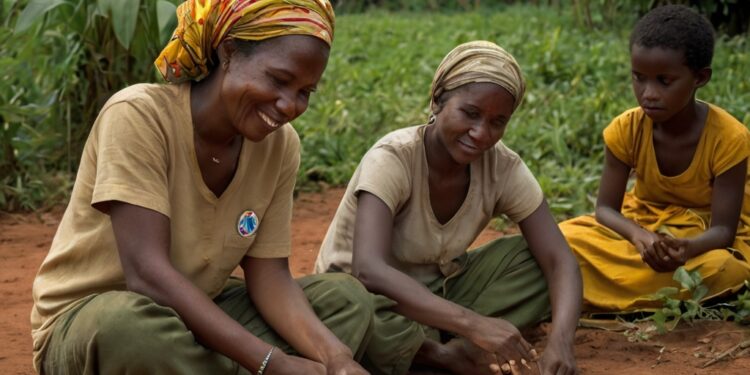Do Peace Corps Volunteers Get Paid

Peace Corps volunteers aren’t working for free, despite what many people assume. The word “volunteer” might make you think it’s unpaid work, but these dedicated individuals receive structured compensation that covers their needs and more.
The compensation goes well beyond a living allowance. Peace Corps volunteers get monthly stipends based on their country of service. They also receive housing support, healthcare coverage, and a substantial readjustment allowance when they complete their service. This well-laid-out payment system will give volunteers peace of mind to focus on their community work.
This piece gets into the complete Peace Corps volunteer compensation package. You’ll learn exactly what volunteers earn, how payments vary between countries, and the many more financial benefits that make service possible for people of all economic backgrounds.

Table of Contents
- 1 Understanding Peace Corps Volunteer Compensation
- 2 Breaking Down the Complete Benefits Package
- 3 Additional Financial Perks and Incentives
- 4 Real Monthly Budget of a Peace Corps Volunteer
- 5 Long-term Financial Benefits and Career Impact
- 6 FAQs about if do Peace Corps volunteers get paid:
- 6.1 Do you get paid to be part of the Peace Corps?
- 6.2 What do volunteers do in the Peace Corps?
- 6.3 Do you make money in the Peace Corps Reddit?
- 6.4 Can you quit the Peace Corps?
- 6.5 How much money do you get when you leave the Peace Corps?
- 6.6 Is it safe to join the Peace Corps?
- 6.7 How hard is it to join the Peace Corps?
- 6.8 What is the average age of the Peace Corps volunteers?
- 6.9 Why is Peace Corps controversial?
Understanding Peace Corps Volunteer Compensation
Peace Corps volunteers get financial support that helps them live modestly yet sustainably during their service. They receive a complete monthly living allowance that lets them serve without money worries.
Base monthly living allowance explained
The base living allowance covers several simple categories that volunteers need. Here’s what it includes:
- Food and nutrition needs
- Household supplies and cleaning materials
- Communication costs (phone, internet)
- Simple clothing requirements
- Local transportation expenses
- Personal care items
- Discretionary spending for recreation
Country-specific payment variations
The Peace Corps adjusts payments based on local economic conditions. Their guiding principle states that volunteers should live modestly by their community’s standards while staying healthy and safe.
The organization provides extra allowances to match regional differences. These funds help pay for:
- Housing costs (when local sponsors don’t provide it)
- Utility expenses
- Location-specific supplements for high-cost areas
How payment amounts are determined
The Peace Corps uses a well-laid-out system to set payment levels. Each post runs yearly surveys to review local living costs and adjust allowances. This process includes:
- Volunteer living allowance surveys (75% response rate needed for major changes)
- Market basket analysis of local goods and services
- Review of seasonal cost changes
- Regional cost comparisons within countries
Country directors and volunteers work together to assess local expenses, which ensures allowances meet essential needs. The organization reviews and updates these amounts to match changing economic conditions and removes temporary factors that might affect the data.
Breaking Down the Complete Benefits Package
Peace Corps volunteers get a detailed benefits package along with their simple living allowance to support them during their service.
Healthcare and medical coverage
The Peace Corps gives full medical and dental coverage to all volunteers. Each location has its own health unit with qualified Peace Corps Medical Officers (PCMOs) who are ready to help 24/7 in emergencies. These healthcare providers give:
- Primary medical care services
- Simple medical skills training
- Required medications and supplies
- Regular health checks
It’s worth mentioning that the Peace Corps will arrange and pay for transportation to a suitable medical facility in a nearby country or the United States if a volunteer needs treatment that’s not available locally.
Housing and utilities allowance
Your housing setup depends on where you’re posted and what you’ll be doing. Some volunteers live with host families, while others get their own place. The Peace Corps makes sure all living spaces meet their 20-year old safety and comfort standards.
The simple amenities vary by location, and volunteers might have access to:
- Running water and electricity
- Simple bathroom facilities
- Required household utilities
Transportation reimbursements
The Peace Corps covers all transportation costs related to your service. You’ll get reimbursed for:
- Your original travel to the host country
- Travel between service locations
- Your trip home after completing service
You might use busses, taxis, or bicycles to get around, depending on your country. The Peace Corps reviews all transportation options and safety rules carefully. They also provide safety gear like Peace Corps-approved bicycle helmets to keep volunteers safe.
Additional Financial Perks and Incentives
Peace Corps volunteers get much more than just monthly allowances and simple benefits. Their service comes with several substantial financial perks that help them stay financially stable.
One-time settling-in allowance
Volunteers receive a one-time settling-in allowance when they arrive at their service location. This payment helps them buy housing supplies, furniture, and equipment they need to set up their new home in the community. The Peace Corps doesn’t use a fixed amount but determines this allowance through detailed surveys of local prices and common items volunteers need.
Readjustment allowance ($10,000)
Volunteers who complete their service receive a readjustment allowance of just over $10,000 (pre-tax). This fund is a vital financial buffer when volunteers transition back to life in their home country. Volunteers can ask for up to 75% of their monthly readjustment allowance during service to handle their ongoing expenses.
Student loan benefits and forgiveness options
The Peace Corps gives great student loan benefits that make service possible for people with educational debt. These benefits include:
- Deferment options for federal loans including Stafford, Perkins, direct, and consolidated loans
- Income-driven repayment plans that could lead to $0 monthly payments during service
- Perkins loan cancelation benefits from 15-70% based on length of service
Peace Corps service counts as qualifying employment for those pursuing Public Service Loan Forgiveness (PSLF). Through this program, volunteers can:
- Make qualifying payments while serving
- Have remaining loans forgiven after 120 monthly payments
- Potentially qualify for $0 monthly payments during service
Without doubt, the Perkins loan cancelation program stands out as one of the most valuable benefits, following this schedule:
- First year of service: 15% cancelation
- Second year: Additional 15%
- Third year: Another 20%
- Fourth year: Final 20%
As with private student loans, volunteers might find relief through their lenders, though options vary by institution. The Peace Corps provides certification letters and documentation to support loan deferment or forgiveness applications throughout service.
Real Monthly Budget of a Peace Corps Volunteer
Peace Corps volunteers must manage their finances carefully since their monthly stipends need to cover all living expenses. They adapt their spending to match local standards while staying healthy and safe.
Sample monthly expenses breakdown
A Peace Corps volunteer’s monthly budget changes substantially based on location. Volunteers in Uganda receive about $225 monthly, and their counterparts in rural Vanuatu earn around $500 monthly. These allowances cover:
- Simple food and groceries
- Utilities and household supplies
- Communication costs (internet: $40/10GB)
- Local transportation
- Personal care items
- Entertainment and recreation
Cost of living comparisons
Peace Corps allowances’ purchasing power is different in each region. Volunteers receive compensation that matches local professional salaries. The organization surveys volunteers yearly to set appropriate allowance levels for each location.
Some volunteers find their stipends generous enough to save for regional travel or special purchases. Those stationed near major towns or cities might need to watch their spending due to higher local prices.
Tips for managing your allowance
Experienced Peace Corps volunteers use these proven strategies to make the most of their monthly stipends:
- Local Market Shopping: Buying food and supplies from local markets instead of imported goods helps stretch the monthly allowance.
- Budget Separation: Smart volunteers create distinct budgets for essentials and optional spending. They often separate funds for:
- Daily food expenses
- Transportation costs
- Communication expenses
- Emergency funds
- Seasonal Planning: Smart budgeting accounts for seasonal price changes, especially in regions where weather affects costs.
- Community Integration: Living like local community members helps fulfill the Peace Corps mission and manage expenses better.
- Emergency Fund: A portion of the monthly allowance should go toward unexpected expenses or future travel.
Peace Corps strongly discourages volunteers from using personal funds from home. Most volunteers find that careful planning and living by local standards lets them maintain a comfortable lifestyle in their assigned communities.

Long-term Financial Benefits and Career Impact
Peace Corps service creates amazing career paths that go way beyond the original service period. Returned Peace Corps Volunteers (RPCVs) find many routes to grow their careers and boost their income.
Federal employment advantages
Peace Corps service gives RPCVs a great advantage in federal employment through Non-Competitive Eligibility (NCE) status. RPCVs can skip the usual competitive hiring process for federal positions when they meet the qualifications.
The salary data shows how well RPCVs perform in different fields:
- Health services professionals make 40.1% more than others in their field
- Education workers earn 13.6% more
- Government employees receive 10.6% higher pay
Federal employees can “buy back” their Peace Corps service time for retirement benefits. The Federal Employees Retirement System (FERS) asks volunteers to pay 3% of their readjustment allowance plus interest. Civil Service Retirement System (CSRS) participants pay 7%.
Graduate school opportunities
The Paul D. Coverdell Fellows program gives RPCVs excellent educational benefits. The program includes:
- Lifetime eligibility for reduced tuition
- Access to assistantships and stipends
- Options at more than 90 universities
- Degree-related internships that serve U.S. communities
Many universities cut costs through the Coverdell Fellowship. Some programs even cover full tuition and add extra benefits. This support helps returned volunteers afford advanced education to boost their careers.
Professional development benefits
Peace Corps experience builds a reliable professional network that connects volunteers to almost a quarter million RPCVs worldwide. This network provides:
- Career growth options
- Professional mentorship
- Project teamwork chances
- Global networking connections
Peace Corps ranks as the top non-profit employer of college graduates. Employers in every sector value the skills and experiences from service, from international development to corporate jobs.
RPCVs learn special skills during their service that help them excel at:
- Project design and management
- Data analysis
- Grant writing
- Budget management
- Cross-cultural communication
Service shapes career paths in powerful ways. To cite an instance, RPCVs work at multilateral development banks, major NGOs, and federal agencies. Their global experience and practical skills make them attractive to employers who need worldwide-minded professionals.
Peace Corps service provides much more than volunteer experience. Volunteers can serve communities worldwide with structured compensation packages, healthcare coverage, and significant financial benefits that support a sustainable lifestyle.
Monthly living allowances, housing support, and detailed medical care help volunteers focus on their vital work. These benefits make Peace Corps service available to people from different economic backgrounds. Financial barriers no longer prevent qualified candidates from joining.
The benefits continue long after the service ends. Returned Peace Corps Volunteers get federal employment priorities, graduate school options, and strong professional networks. A $10,000 readjustment allowance helps them transition smoothly to their next chapter.
Peace Corps service is a life-changing chance that combines immediate financial support with career growth. Volunteers live simply during their service and gain experience. They develop vital skills and build lasting connections that shape their careers for years ahead.
FAQs about if do Peace Corps volunteers get paid:
Do you get paid to be part of the Peace Corps?
Peace Corps volunteers do not receive a traditional salary but are provided with a modest living allowance to cover basic expenses. The question “do Peace Corps volunteers get paid” is often asked, and while they don’t earn a salary, they do receive benefits such as housing, medical care, and a readjustment allowance after completing their service. This compensation ensures volunteers can focus on their work without financial strain.
What do volunteers do in the Peace Corps?
Peace Corps volunteers engage in a wide variety of projects, including education, healthcare, agriculture, and community development. Their tasks often involve teaching, training, or providing technical assistance to local communities. While volunteers focus on service, many also wonder “do Peace Corps volunteers get paid,” as the financial support they receive helps sustain their work.
Do you make money in the Peace Corps Reddit?
On Reddit and other forums, discussions about Peace Corps compensation often clarify that volunteers don’t “make money” in the traditional sense. Instead, they receive allowances to cover living expenses and a readjustment stipend upon completion of service. This aligns with the question “how much do Peace Corps volunteers get paid,” emphasizing that the financial support is minimal but sufficient for the role.
Can you quit the Peace Corps?
Yes, Peace Corps volunteers can leave their service early if necessary, although it is generally encouraged to fulfill the commitment. Volunteers must communicate their decision with Peace Corps staff and complete an official process to resign. While the focus is often on “do volunteers in the Peace Corps get paid,” it’s also important to consider the flexibility and challenges of the role.
How much money do you get when you leave the Peace Corps?
When volunteers complete their service, they receive a readjustment allowance to help transition back to life in their home country. As of recent years, this allowance is approximately $375 for each month of service. This benefit often answers “what do Peace Corps volunteers get paid” after their service and helps them reintegrate financially.
Is it safe to join the Peace Corps?
Joining the Peace Corps is generally safe, but volunteers are placed in diverse settings where challenges may arise. The organization provides extensive training, safety protocols, and support to ensure volunteers’ well-being. While safety is a concern, so is understanding “do volunteers in the Peace Corps get paid” and the overall benefits of serving.
How hard is it to join the Peace Corps?
Joining the Peace Corps can be competitive, requiring a thorough application, interviews, and meeting specific qualifications. Volunteers need to demonstrate adaptability, cultural sensitivity, and dedication to service. While people often ask “how much do Peace Corps volunteers get paid,” the focus is typically on the rewarding experience and skills gained.
What is the average age of the Peace Corps volunteers?
The average age of Peace Corps volunteers is around 28 years old, but people of all ages, including retirees, are encouraged to apply. This diversity enriches the volunteer experience and the communities they serve. While the question “do Peace Corps volunteers get paid” is common, many volunteers are more focused on the impact they can make.
Why is Peace Corps controversial?
The Peace Corps faces criticism for various reasons, including the cultural impact of its projects and the challenges volunteers face in remote areas. Critics question the effectiveness of some programs and the organization’s ability to address volunteers’ safety. Despite these controversies, many still ask “do Peace Corps volunteers get paid” to better understand the financial and logistical aspects of service.
